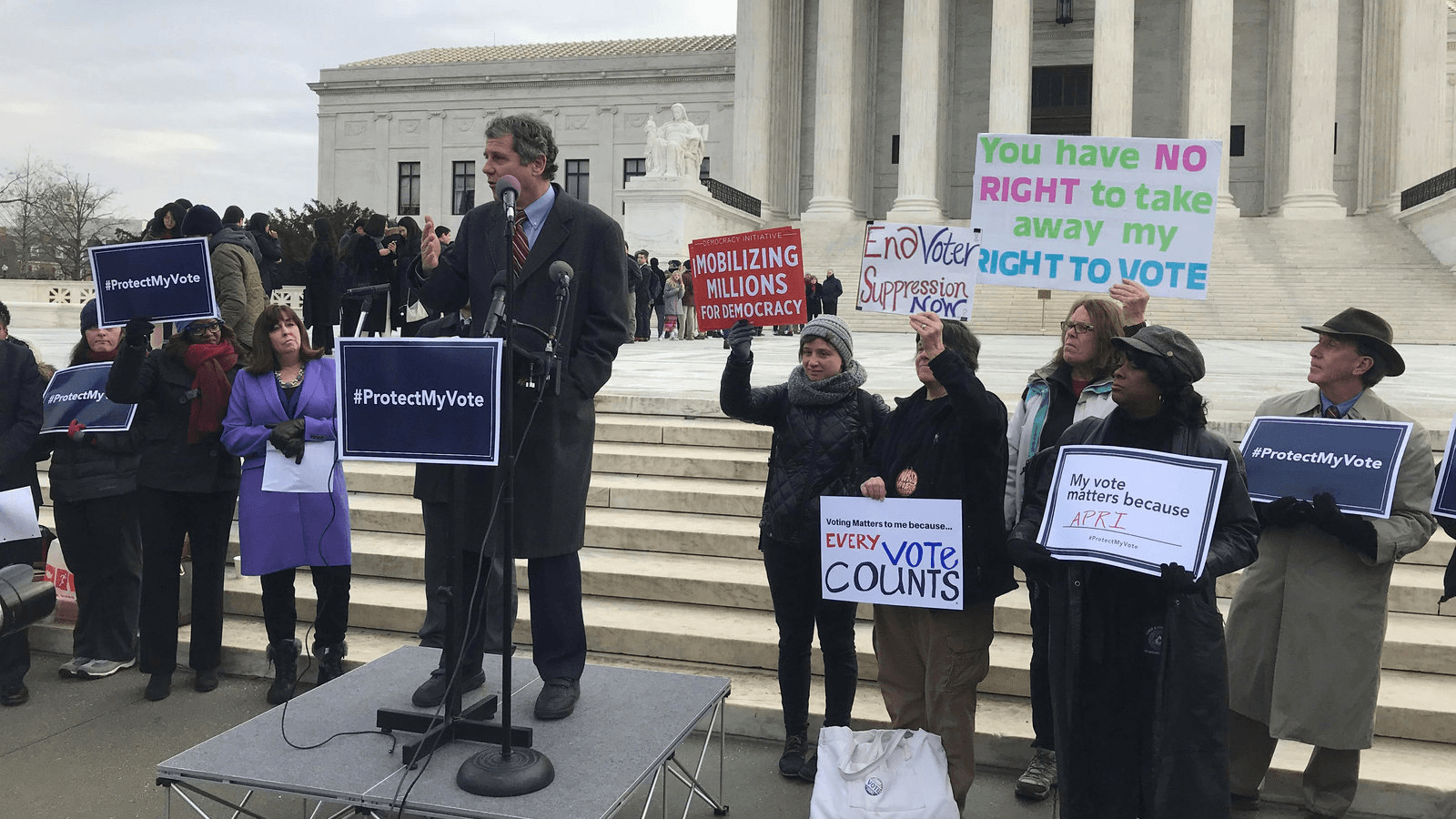US Senator Sherrod Brown (D-OH) addresses a rally ahead of arguments in a key voting rights case involving a challenge to the Ohio’s policy of purging infrequent voters from voter registration rolls outside the US Supreme Court in Washington, Jan. 10, 2018.
Conservative and liberal US Supreme Court justices appeared at odds on Wednesday in a closely watched voting rights case, differing over whether Ohio's purging of infrequent voters from its registration rolls — a policy critics say disenfranchises thousands of people — violates federal law.
The nine justices heard about an hour of arguments in Republican-governed Ohio's appeal of a lower court ruling that found the policy violated a 1993 federal law aimed at making it easier for Americans to register to vote.
Conservative justices signaled sympathy to the state's policy while liberal justices asked questions indicating skepticism toward it. The court has a 5-4 conservative majority.
"The reason for purging is they want to protect voter rolls," said Justice Anthony Kennedy, a conservative who often casts the deciding vote in close decisions. "What we're talking about is the best tools to implement that purpose."
States try to maintain accurate voter rolls by removing people who have died or moved away. Ohio is one of seven states, along with Georgia, Montana, Oklahoma, Oregon, Pennsylvania and West Virginia, that erase infrequent voters from registration lists, according to plaintiffs who sued Ohio in 2016.
They called Ohio's policy the most aggressive. Registered voters in Ohio who do not vote for two years are sent registration confirmation notices. If they do not respond and do not vote over the following four years, they are purged.
The Supreme Court's ruling, due by the end of June, could affect the ability to vote for thousands of people ahead of November's midterm congressional elections.
The arguments on Wednesday zeroed in on whether a state could send a registration confirmation notice based merely on a person's failure to vote, which the plaintiffs challenging the policy argue is barred by federal law.
Chief Justice John Roberts and Justice Samuel Alito, both conservatives, suggested that a person's failure to vote could be used as evidence for possible removal from the registration list. "It's evidentiary, it's not ground for removal itself," Alito told the plaintiffs.
Liberal Justice Sonia Sotomayor said the policy could further disenfranchise people who already find it more difficult to vote, including minorities and the homeless, those who cannot easily make it to polling places. She suggested it was unreasonable to use non-voting as a trigger for the process.
Ohio Solicitor General Eric Murphy, defending the state's policy, told her, "Nothing in the statute suggests there is a limitation on the trigger."
Ohio's policy would have barred more than 7,500 voters from casting a ballot in the November 2016 election had the Cincinnati-based 6th US Circuit Court of Appeals not ruled against the state.
Voting rights has become an important theme before the Supreme Court. In two other cases, the justices are examining whether electoral districts drawn by Republican lawmakers in Wisconsin and Democratic lawmakers in Maryland were fashioned to entrench the majority party in power in a manner that violated the constitutional rights of voters. That practice is called partisan gerrymandering.
Use it or lose it
The plaintiffs suing Ohio, represented by liberal advocacy group Demos and the American Civil Liberties Union, said that purging has become a powerful tool for voter suppression. They argued that voting should not be considered a "use it or lose it" right.
Dozens of voting rights activists gathered for a rally outside the courthouse before the arguments, with some holding signs displaying slogans such as "Every vote counts" and "You have no right to take away my right to vote."
"This is about government trying to choose who should get to vote. We know that's wrong," US Senator Sherrod Brown, a Democrat from Ohio, said at the rally.
Democrats have accused Republicans of taking steps at the state level, including laws requiring certain types of government-issued identification, intended to suppress the vote of minorities, poor people and others who generally favor Democratic candidates.
A 2016 Reuters analysis found roughly twice the rate of voter purging in Democratic-leaning neighborhoods in Ohio's three largest counties as in Republican-leaning neighborhoods.
The plaintiffs include Larry Harmon, a software engineer and US Navy veteran who was blocked from voting in a state marijuana initiative in 2015, and an advocacy group for the homeless. They said Ohio's policy ran afoul of the 1993 National Voter Registration Act, which prohibits states from striking registered voters "by reason of the person's failure to vote."
Ohio argued that a 2002 US law called the Help America Vote Act contained language that permitted the state to enforce its purge policy. Republican Ohio Secretary of State Jon Husted noted that the state's policy has been in place since the 1990s, under Republican and Democratic secretaries of state.
Andrew Chung of Reuters reported from Washington.
Our coverage reaches millions each week, but only a small fraction of listeners contribute to sustain our program. We still need 224 more people to donate $100 or $10/monthly to unlock our $67,000 match. Will you help us get there today?
